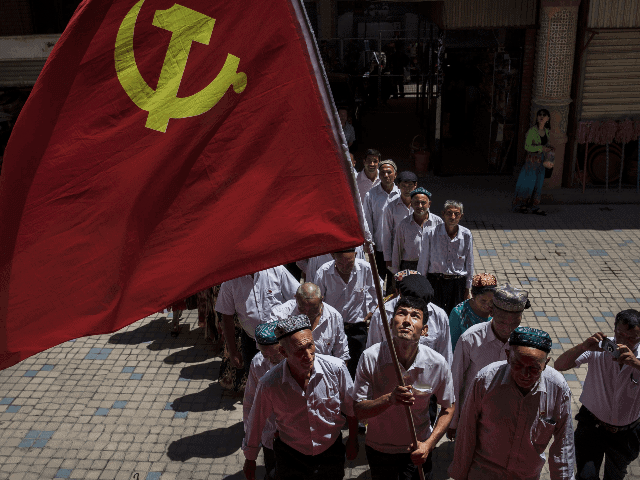Report: Afghanistan Lets Go 10 Chinese Caught Building Fake Uyghur Terror Cell

The human rights magazine Bitter Winter reported on Wednesday that the government of Afghanistan deported ten Chinese nationals last week initially accused of engaging in terrorist activity, but later believed to be attempting to create a fake Uyghur terrorist cell to defame the ethnic group.
Reports of the arrests in Kabul first surfaced in India’s Hindustan Times and named the alleged leader of the group as Li Yangyang, a Han Chinese name. The Hindustan Times was the first to report, last week, that Kabul had reached a deal with China to return the Chinese citizens implicated to their home country without creating a public scandal.
“Last week, a chartered plane left Kabul airport to an unknown destination in China. Aboard were ten Chinese nationals, who had been arrested in Afghanistan on December 10,” Bitter Winter noted on Wednesday, “some in the house of one Li Yangyang, believed to be a high-profile intelligence agent, where weapons, ammunitions, and drugs had also been found.”
Afghan authorities had collected evidence linking the group of ten to the Haqqani Network, a deadly jihadist organization with ties to the Taliban. Subsequent evidence seemed to indicate, however, that the group in question was not looking to engage in legitimate jihadist activity but, rather, create a fraudulent jihadist organization presumably manned by ethnic Uyghur people, according to the initial report from the Hindustan Times.
The Indian newspaper stated that China attempted to pressure the Afghan government to “hush up the case.” Given the little information from officials in either Afghanistan or China, if the story is true, Beijing may have succeeded. Afghanistan’s First Vice President Amrullah Saleh publicly denied that any arrests of Chinese citizens had occurred at all.
“No foreign citizen has been arrested in an effort operation in the Khairkhaneh area. The arrested are the palmadis that are under the scope,” Saleh said in December in a Facebook post. “A number of them have been arrested on suspicion of being involved in kidnapping and assassination.”
By the new year, however, the head of Afghanistan’s National Directorate of Security (NDS) admitted that Chinese individuals had been arrested in the country.
“Regarding the Chinese network, I can confirm for you that, yes, they have been arrested; however, I can’t go into the details because of the sensitive nature of the case,” Ahmad Zia Saraj affirmed last week, according to Afghanistan’s Tolo news agency.
The Bitter Winter details largely regurgitate a Hindustan Times report from last week that claims the Chinese citizens arrested have returned home. Citing “people familiar with the matter,” the Indian newspaper claimed that Afghanistan had demanded a formal apology not to file charges against those arrested. No evidence exists that China provided an apology, but “diplomats and security officials in Kabul … confirmed to Hindustan Times that the 10 had been allowed to board a chartered aircraft that flew them out of the country on Saturday,” January 2, the newspaper claimed. The report asserted that Afghan President Ashraf Ghani had personally approved the release.
The reports followed the announcement in November by the government of the United States that it would no longer list the East Turkestan Islamic Movement (ETIM), an alleged Uyghur jihadist organization, as a designated foreign terrorist organization. Uyghurs refer to Xinjiang as “East Turkestan,” reflecting their Turkic heritage; “Xinjiang” comes from the Han Mandarin for “frontier land.” While once identified as a legitimate terrorist outfit, the head of ETIM, Hasan Mahsum, died in 2003, and American authorities asserted in explaining their decision, “for more than a decade, there has been no credible evidence that ETIM continues to exist.”
China has used the alleged existence of Uyghur jihadist organizations as a reason to implement extreme repressive tactics against the Uyghur ethnic minority. China has accused hundreds of unidentified Uyghurs of joining the Islamic State and claims that the lack of terrorist activity in Xinjiang is the result of its policy of building concentration camps for millions of people belonging to the indigenous population of Xinjiang.
As of April 2020, the U.S. government believed that as many as 2 million Uyghurs, Kazakhs, Kyrgyz, and other ethnic minority people were trapped in Xinjiang concentration camps. Survivors of the camps have testified publicly to being tortured and forced into indoctrination classes to renounce their Islamic faith and worship Chinese dictator Xi Jinping. Some say they experienced or witnessed the widespread use of rape, forced abortions, and forced sterilizations; some mothers say Chinese government officials killed their infants in the camps. Others say they were enslaved, forced to engage in labor to manufacture products for the profit of the government.
The Chinese Communist Party claims the camps are necessary to fight jihad and those imprisoned there are uneducated people who require “vocational education” to find adequate work. Those who struggle economically, Beijing claims, are more likely to engage in terrorism, so the state invested in developing “vocational centers” to discourage them from embracing “extremism.”
Photo: Kevin Frayer/Getty Images
Link: Report: Afghanistan Frees Chinese Caught Building Fake Terror Cell (breitbart.com)











